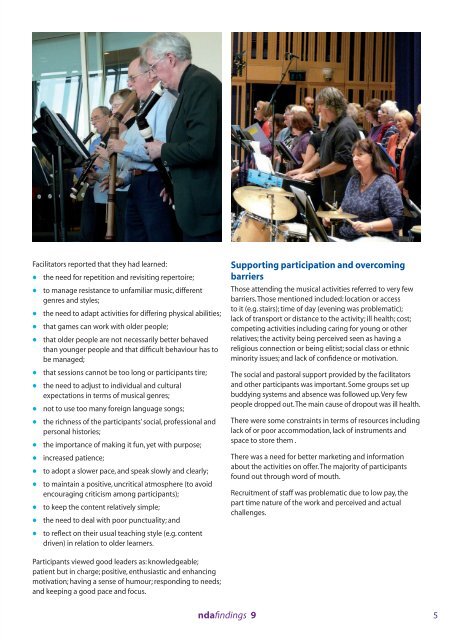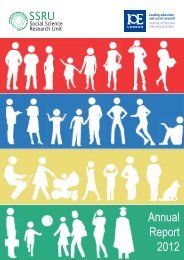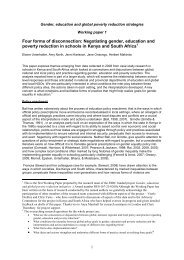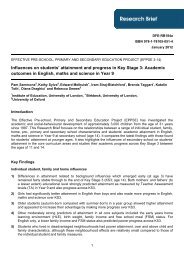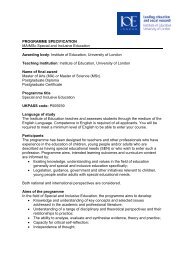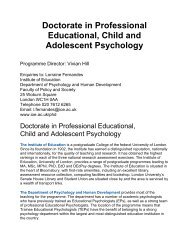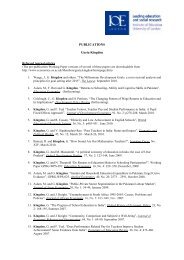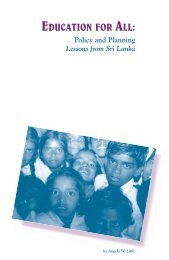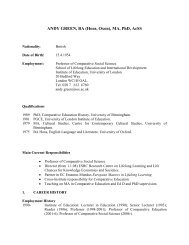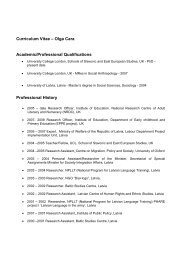nda findings 9 - Institute of Education, University of London
nda findings 9 - Institute of Education, University of London
nda findings 9 - Institute of Education, University of London
Create successful ePaper yourself
Turn your PDF publications into a flip-book with our unique Google optimized e-Paper software.
Facilitators reported that they had learned:<br />
• the need for repetition and revisiting repertoire;<br />
• to manage resistance to unfamiliar music, different<br />
genres and styles;<br />
• the need to adapt activities for differing physical abilities;<br />
• that games can work with older people;<br />
• that older people are not necessarily better behaved<br />
than younger people and that difficult behaviour has to<br />
be managed;<br />
• that sessions cannot be too long or participants tire;<br />
• the need to adjust to individual and cultural<br />
expectations in terms <strong>of</strong> musical genres;<br />
• not to use too many foreign language songs;<br />
• the richness <strong>of</strong> the participants’ social, pr<strong>of</strong>essional and<br />
personal histories;<br />
• the importance <strong>of</strong> making it fun, yet with purpose;<br />
• increased patience;<br />
• to adopt a slower pace, and speak slowly and clearly;<br />
• to maintain a positive, uncritical atmosphere (to avoid<br />
encouraging criticism among participants);<br />
• to keep the content relatively simple;<br />
• the need to deal with poor punctuality; and<br />
• to reflect on their usual teaching style (e.g. content<br />
driven) in relation to older learners.<br />
Supporting participation and overcoming<br />
barriers<br />
Those attending the musical activities referred to very few<br />
barriers. Those mentioned included: location or access<br />
to it (e.g. stairs); time <strong>of</strong> day (evening was problematic);<br />
lack <strong>of</strong> transport or distance to the activity; ill health; cost;<br />
competing activities including caring for young or other<br />
relatives; the activity being perceived seen as having a<br />
religious connection or being elitist; social class or ethnic<br />
minority issues; and lack <strong>of</strong> confidence or motivation.<br />
The social and pastoral support provided by the facilitators<br />
and other participants was important. Some groups set up<br />
buddying systems and absence was followed up. Very few<br />
people dropped out. The main cause <strong>of</strong> dropout was ill health.<br />
There were some constraints in terms <strong>of</strong> resources including<br />
lack <strong>of</strong> or poor accommodation, lack <strong>of</strong> instruments and<br />
space to store them .<br />
There was a need for better marketing and information<br />
about the activities on <strong>of</strong>fer. The majority <strong>of</strong> participants<br />
found out through word <strong>of</strong> mouth.<br />
Recruitment <strong>of</strong> staff was problematic due to low pay, the<br />
part time nature <strong>of</strong> the work and perceived and actual<br />
challenges.<br />
Participants viewed good leaders as: knowledgeable;<br />
patient but in charge; positive, enthusiastic and enhancing<br />
motivation; having a sense <strong>of</strong> humour; responding to needs;<br />
and keeping a good pace and focus.<br />
<strong>nda</strong><strong>findings</strong> 9<br />
5


